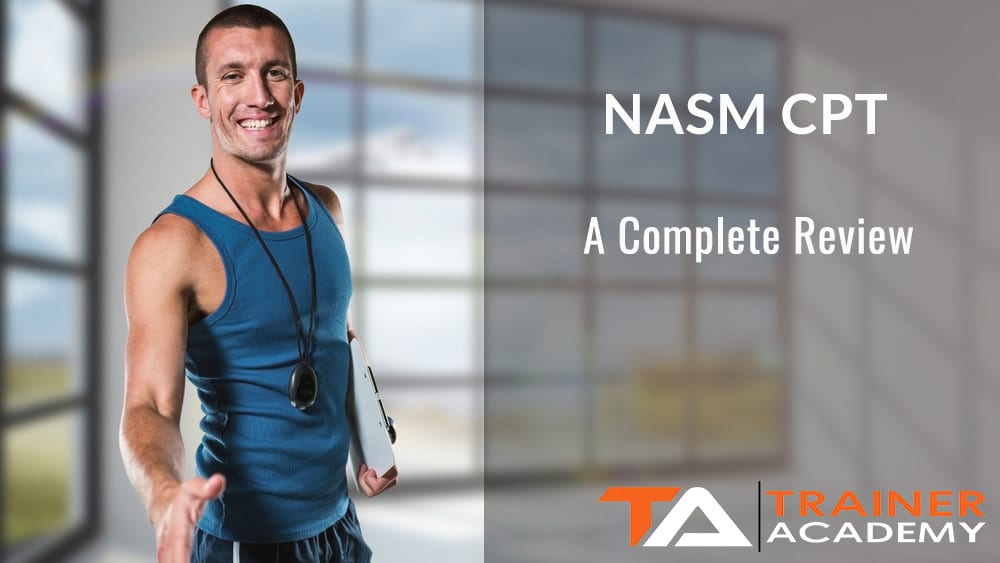Hello, and welcome to Trainer Academy’s best strength and conditioning certifications shootout.
In this article, we’re going to put the spotlight on 5 of our favorite strength training certifications and provide some insight into what they can offer you as a trainer.
In this article, we will be covering:
- The time required and exam requirements for each certification
- Breakdowns of the best strength and conditioning certifications
- The certification and recertification information
- Insight into the career of certified strength and conditioning specialists
The goal of this article will be to help you decide on the best option for you based on your circumstances and career aspirations as a certified strength and conditioning coach.
So with nothing further to say, let’s dive right in.
We highly recommend that you take our helpful quiz to find the best strength and conditioning certification for you.

Exclusive TA Offers |
||
Most Popular Cert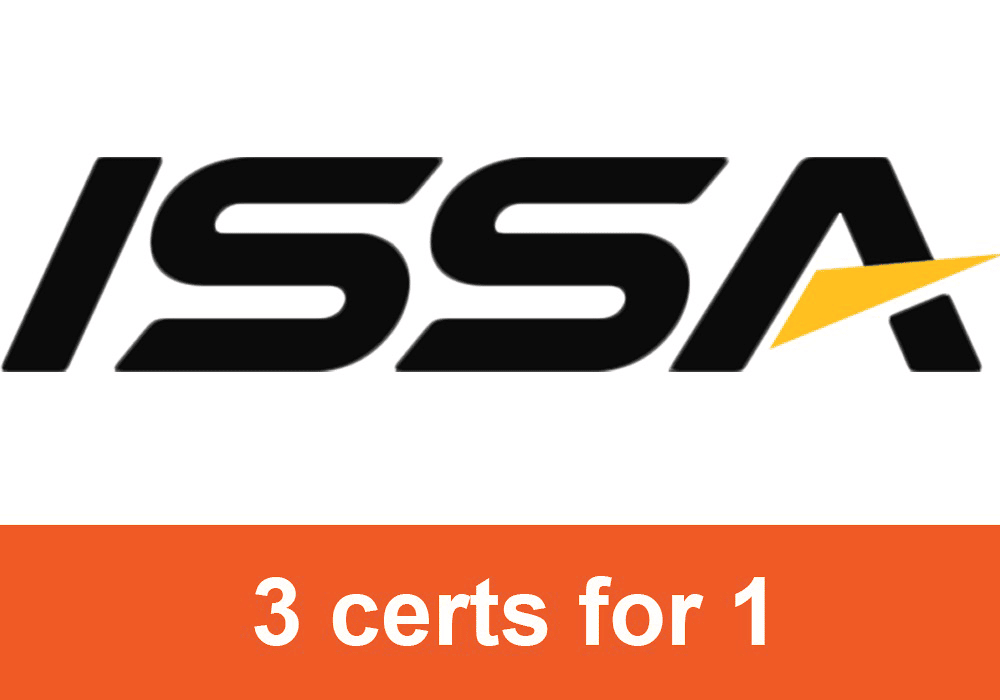 | Great Option | Best Cert for you?  |
Good Option | Good Option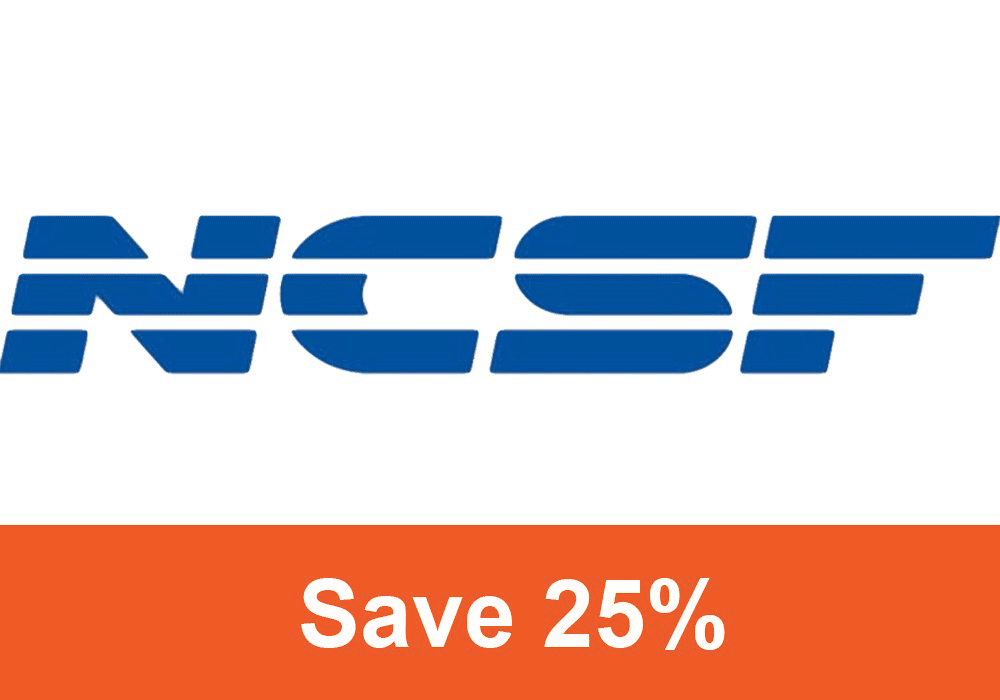 | Good Option |
Why are we qualified to recommend the top strength and conditioning certifications?
Trainer Academy’s team of fitness professionals holds many of the major strength and conditioning certifications listed below as well as many other exercise certifications such as several of the top personal trainer certifications and nutrition certifications.
Having analyzed many of the best certifications, we know which programs set you up for a profitable career in the fitness industry.
We also know some of the pitfalls you may encounter as a budding strength and conditioning coach and how to avoid them.
Once you complete this article, you’ll be ready to select the best strength and conditioning certification for your current needs.
Our Top Strength and Conditioning Certification Pick
ISSA Strength and Conditioning Certification Program
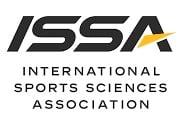
- Best value with ISSA Elite Trainer package
- Huge variety of self-paced courses that you can do remotely
- ISSA exam is an untimed, open-book test and available online
- Students who pass final exam are set up with a free professional website
A Quick Look at the Best Strength and Conditioning Certifications
- Best overall: ISSA Strength and Conditioning Certification
- Best for collegiate athletics: NSCA Certified Strength and Conditioning Specialist
- Best value: NCSF Strength Coach
- Best study system: NASM Performance Enhancement Specialist
- Most complete: CSCCa
Best Strength and Conditioning Certification Reviews
Let’s start by looking at all of the most popular strength and conditioning certifications from the best fitness companies within the industry.

Best overall: ISSA Strength and Conditioning Certification
PROS
CONS
Summary:
ISSA, or the international sports sciences association, is a great certifying agency. With over 30 years in the game and being a leader in the online, distance learning spaces, they’ve learned to get a lot right.
Their S&C certification may not be as hyper-serious as others such as CSCCa and NSCA CSCS, but the quality and relevance of the knowledge contained are definitely on par in terms of program design.
This one is great if you want to work with general population groups as a supplement to normal PT work.
Starting at $640
Prices listed are non-promotional, full-price, non-member prices.
The ISSA Strength and Conditioning Certification offers far more detail than ISSA’s Personal Training Certification, yet the course materials are just as easy to pour through.
The chapter layout includes the following topics:
- Introduction to Strength and Conditioning
- Nervous System
- Muscular System
- Skeletal System and Joint Actions
- Cardio Respiratory and Support Systems
- Bioenergetics
- Biomechanics
- General Assessments
- Performance Assessments
- Principles of Program Design
- Flexibility
- Plyometric Exercises
- Core Exercises
- Lower-Body Exercises
- Upper-Body Exercises
- Power and Olympic-Style Weight Lifting
- Resistance Training Systems
- Applying Periodization
- Cardiorespiratory Programming
- Recovery and Injury Prevention
- Nutrition
- Supplementation
- Performance Psychology
- Professional Practice
The ISSA study system includes a PDF of the textbook, which is easy to thumb through, online lectures and quizzes on each chapter.
The other reason ISSA excels is in some of their reasonable packages.
If you opt for the ISSA Elite Trainer package, you’ll get a personal trainer certification, a nutritionist certification, and the Strength and Conditioning cert at only $999.
Having the 3 certifications will certainly make you a better Personal Trainer in the long run.
It will enable you to work with different groups. When you’re competent in multiple fields there’s much better job opportunity.
We always recommend looking at getting multiple certifications when you start off because it allows you to stand out from the competition.
Make sure to visit ISSA’s website to see if the Elite Trainer deal is still in play. It’s a tough offer to pass up.
Working on your skills development as a fitness professional always pays off.
We have a comparison between ISSA or NASM organizations, if you are deciding between the two, as well as ISSA exam info.

Best for collegiate athletics: NSCA CSCS
PROS
CONS
Summary:
One of the most prestigious strength and conditioning credentials out there, the NSCA CSCS, is a great investment for big-shot career aspirations, especially when looking to work with collegiate strength athletes and other top areas of athletic performance.
Starting at $475
Prices listed are non-promotional, full-price, non-member prices.
The recognition courted amongst seasoned fitness professionals means that you will have access to some great job opportunities.
The CSCS covers over 700 pages of detailed strength and conditioning material. You learn everything from detailed body systems, anatomy, biomechanics, how to coach an athlete based on their individual sports, basic sports psychology, fitness assessments and more.
The CSCS also offers one of the most complete chapters on periodization and Speed, Agility, and Quickness (SAQ) training.
Compared to ISSA or NASM, the NSCA’s CSCS certification may be a bit overkill if you just want to be a personal trainer, so we recommend looking towards other options if that’s your goal.
The NSCA CSCS certification is better suited for trainers with some skin in the game. Experience within the field helps unearth much of the wisdom required for you to know how to become a strength and conditioning coach or specialist.
The CSCS test is challenging and noted as one of the hardest in the fitness industry and It is likely looked up to for this reason. It’s definitely a step up from the NSCA CPT exam in terms of difficulty.
While the price for the exam starts at $475, you can lower fees by becoming a NSCA member. Members get discounts on the test cost as well as study materials and CEUs.
To find the current CSCS cost, go to NSCA CSCS by clicking on the link here.
Note that the CSCS requires you to have a bachelor’s degree or higher to qualify for the certification. Earning a bachelor’s degree is not only a prerequisite for the CSCS certification, but it also provides a solid foundation of knowledge in exercise science and physiology for certification candidates.
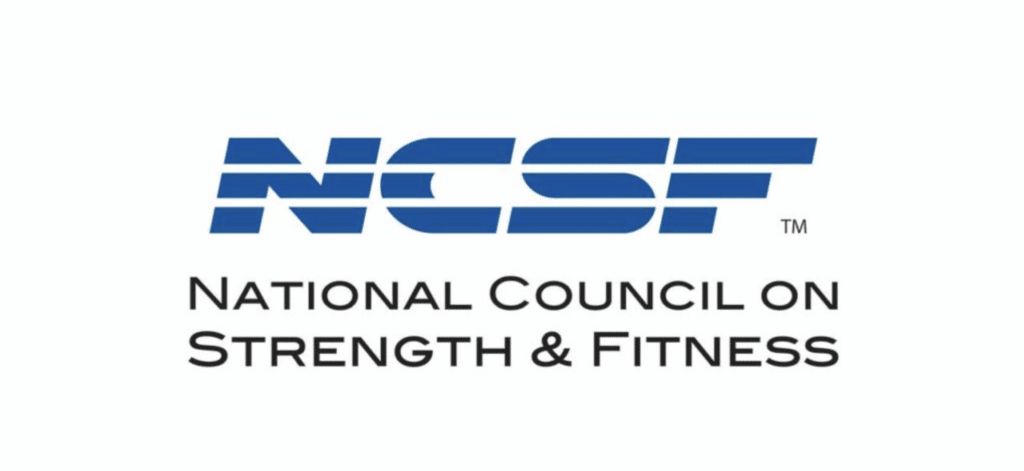
Best value: NCSF Strength Coach
PROS
CONS
Summary:
The National Council on Strength & Fitness (NCSF) is a well-recognized certifying agency with a great reputation amongst peers in the industry.
This organization is a little newer on the scene than NASM or NSCA, which you can read about in our NCSF CPT review, but well respected.
Starting at $799
Prices listed are non-promotional, full-price, non-member prices.
The NCSF Strength Coach certification is a great value for money approach to the S&C field, which will allow you to work with a range of clients from pro athletes to physique competitors.
Of all the strength and conditioning certifications, NCSF’s textbook is the easiest to read.
We like that they include practical insights about nutrition as well as exercise, which gives new coaches a good overall foundation to work from.
Nutrition forms a huge part of any athletic pursuit, so knowing how metabolism works in the body will help you train your athletes, even if you don’t focus solely on the nutrition side of things. In addition to performance, nutrition is a huge component when it comes to overall wellness, so don’t ignore the topic.
In fact, NCSF covers all the tools you need to know about strength and conditioning save the business area.
Our favorite aspect of the NCSF Strength Coach certification is the price. NCSF lists the base price at $799, but you can usually find the course for half off, meaning you only pay $399.
Not only that, but NCSF offers some incredible bundles, where you can get the Certified Strength Coach (CSC) along with either the NCSF Certified Personal Trainer (CPT) or Sports Nutrition Specialist (SNS) for a just a few hundred dollars more. Having multiple certifications puts you in a better position to find work as you have more qualifications on your resume.
Stay updated with the latest info about NCSF by clicking this link.

Best study system: NASM PES
PROS
CONS
Summary: NASM, or the National Academy of Sports Medicine, is by far the most well-known certifying institution here. We’ve already covered that.
But this notoriety is not unearned. NASM has such a stellar reputation because it delivers on a promise of top-notch education, especially when it comes to its certified CPT program for anyone learning how to be a personal trainer.
Starting at $699
Prices listed are non-promotional, full-price, non-member prices.
The NASM PES is not just a great cert; it’s also a convenient one. The lack of recertification means you have one of the most accepted S&C certs for life.
The latest NASM certification review has more than enough info to get you started.
At Trainer Academy believe that having multiple certs at once is real asset in your toolbox.
Being able to coach athletes is a valuable skill, but the vast majority of jobs out there include working with the general population.
You also want to know a bit about nutrition as well, so you can be an informed coach helping a client achieve optimal health.
Currently NASM does have a few options for you if you want to purchase multiple certs at once and not break the bank doing it.
There’s a Nutrition and Fitness bundle for $999 and a NASM Elite Trainer bundle which includes 6 different certifications.
One of the certifications you could pick up with the Elite Trainer bundle is NASM’s Corrective Exercise Specialist. This will aid in your ability to forsee and prevent injuries in your athletes, which could be a huge asset in your toolbox.
Go to the NASM website to see if the offers are still available. When NASM has a deal, it’s worth considering.
We also have NASM vs ACE comparison for you as well and ACE study guides and ACE test questions to make studying even easier for that cert.
Exclusive TA Offers |
||
Most Popular Cert | Great Option | Best Cert for you?  |
Good Option | Good Option | Good Option |

Most complete: CSCCa Master Strength & Conditioning Coach
PROS
CONS
Summary: The CSCCCa MSCC is the big kahuna when it comes to S&C credentials. It is revered, recognized, and accepted almost everywhere.
Starting at $470
Prices listed are non-promotional, full-price, non-member prices.
The CSCCCa MSCC is the most difficult strength and conditioning certification to obtain, requiring, amongst other things, at least 12 years of full-time experience in the strength and conditioning field before you can even think of applying.
In addition, you must complete at least a 640-hour internship program before you sit for the exam.
This one is definitely for established pros, but you just might be one, ready to take your career and credentials to the ultimate level!
The CSCCa MSCC not only includes text-based learning, but also in-person instruction. The exam includes practical components as well.
What Is A “Strength and Conditioning Coach”
A strength and conditioning coach is a fitness expert who administers adaptive training designed either to enhance performance, correct dysfunction, rehabilitate from injury, or prevent future injury by optimizing biomechanical effectiveness, and improving joint stability.
Strength and conditioning protocols are mostly reliant on resistance training with a prominent inclusion of flexibility/ROM methodologies as well as balance/stability-based exercises.
Strength and conditioning are important for normal human function but are especially pivotal in serious athletes’ success.
For this reason, S&C experts often have roles in the professional sports industry, which can be a very lucrative career path.
That’s the basic strength and conditioning coach job description!
How to Become A Strength and Conditioning Coach
Becoming a strength and conditioning coach requires a more in-depth practical and academic understanding of the techniques and principles that govern good exercise instruction.
This can be its own fitness certification for a first-time cert, or an additional certification pursued by an already certified personal trainer.
That’s because successful strength and conditioning hinge on having a precise grasp of biomechanics from a general perspective as well as the ability to identify individual movement profiles and plan how to enhance those accordingly.
It’s also because, in the case of professional sports, the high stakes demand meticulous attention to detail since billions of dollars are on the line as well as entire livelihoods in some cases.
Incorrect administration of S&C protocols can lead to harmful situations such as exacerbating dysfunction or even severe injury.
That’s why a strength and conditioning coach certification often comes with a demanding list of prerequisites compared to other fitness certifications. In addition, there is a focus on injury prevention specific to athletes.
After completing a strength and conditioning program, you will be able to make training programs for athletes and future athletes. A lot of these will primarily be online courses.
Let’s take a look at the four steps to S&C success!
Step 1: Determine Your Prerequisites
As mentioned, the prerequisites for strength coach certification are a little more stringent than the standard CPT certs you’d usually get.
Many of the certs you’ll encounter in this article require some form of extensive experience and/or other existing qualifications such as a bachelor’s degree or a preliminary certification.
Aside from these extra prerequisites, your standard ones apply in that you need:
- to be of age (18+ years old)
- have current first responder certifications (First Aid, CPR/AED)
- have a high school diploma or equivalent
- Produce a government-issued photo ID
Step 2: Find the Best S&C Certification for YOU
There are 5 S&C certs we will be touching on in this article. These are:
- ISSA Strength and Conditioning Certification
- NSCA Certified Strength and Conditioning Specialist
- NCSF Strength Coach
- NASM Performance Enhancement Specialist
- CSCCa Master Strength & Conditioning Coach
Each has its own merits and drawbacks, which we will take a deep dive into to decide on the best choice for you.
Your circumstances and career objective will influence which certification plays best towards a successful career.
Step 3: Prepare for Your Exam & Pass!
Once you’ve settled on a choice, it’s time to grab the bull by the horns and take on the exam.
Most of these exams cover more in depth detail than PFT tests so if you were wondering how long does it take to become a fitness trainer, it will take a bit longer than that with these specialization certs.
With adequate preparation, good time management, and the elimination of distractions, exam success is guaranteed.
Trainer Academy prides itself on providing the best third-party study resources available, so when it comes time to prepare, you know where to find us!
Click on this link to unravel these study materials and kick off your learning journey.
Step 4: Start Working with Strength and Conditioning Clients
The strength and conditioning market is a tad different from your run-of-the-mill fitness clientele.
People who seek S&C coaching have precise and sometimes high demands, and that’s not even considering the professional sports market.
What that means for your career as a strength and conditioning specialist is that the setup will have to be much more planned out. Marketing and sales won’t be as “shoot from the hip” as it is with making money as a personal trainer, typically.
You will need to network and interact with industry peers a lot more since S&C work required more depth of practice and a reputation that goes with it.
Once you do get the ball rolling, strength and conditioning can be quite lucrative. So, the job outlook is good just not the same as the personal trainer outlook. We’ve already mentioned a few times how you may have the opportunity to work with elite athletes.
Strength and conditioning coach-certified individuals will have a focus on things specific to athletes and the upper levels of training like Olympic weightlifting, plyometrics, and more.
It is important to test each athlete’s eligibility for these specific training styles.
After you begin working with different athletes you may realize you also want to pick up additional qualifications like a sports nutrition certification, so you can help athletes with a plan to fuel their workouts.
If you are interested adding nutrition to you list of skills we an ISSA Nutritionist Certification review as well as a comparison of ISSA Nutritionist vs NASM CNC and a Precision Nutrition Certification review, which is one of our top picks for working with athletes.
Before we proceed, we also have some top strength and conditioning certifications that comes highly recommended if you just received your personal training certification.
Click on the links below to read more about them.
What to look for when choosing a strength and conditioning certification?
Accreditation
A big consideration going in with any cert is accreditation. This stamp of approval assures that what you’re paying for is nothing short of a top-tier educational service.
Accreditation is a certificate for a certification, letting you know that it is up to code when it comes to:
- Quality and relevance of the content
- Meeting industry standards
- Having the correct recognition and acceptance
- Administering the training and certification within approved and standardized protocols.
Accreditation is also a good way to avoid scams since most opportunistic courses wouldn’t have passed the standard assessments that an accrediting commission would put across.
In that way, accreditation helps you identify which certs are good and helps you identify and avoid the bad ones.
As far as accreditation goes, there are two major bodies concerned with that sort of authentication.
Those are the NCCA, short for the National Commission of Certifying Agencies, and the DEAC, short for Distance Education Accrediting Commission.
| Certification | Accreditation |
|---|---|
| ISSA Strength and Conditioning Certification | DEAC |
| NSCA Certified Strength and Conditioning Specialist | NCCA |
| NCSF Strength Coach | NCCA |
| NASM Performance Enhancement Specialist | NCCA |
| CSCCa Master Strength & Conditioning Coach | NCCA |
As you can tell, pretty much all of these sports performance courses are NCCA accredited certifications except for ISSA SCC.
In any case, you’re in good hands with these or any other certifications as long as anyone of these seals of approval is on them.
Study Materials Rating
A big consideration when it comes to selecting a certification is the study materials they come with.
This is what’s going to help you prepare for the coming exam, and your success pretty much hinges on the course material, as you would imagine.

We’ve taken a look at the materials on offer and given them a rating out of 10 based on our educated opinion on what good perp material should constitute.
We would know since putting together second-to-none study packages is kind of our thing, so let’s take a look:
| Certification | Rating |
|---|---|
| ISSA Strength and Conditioning Certification | 7 |
| NSCA Certified Strength and Conditioning Specialist | 6 |
| NCSF Strength Coach | 8 |
| NASM Performance Enhancement Specialist | 8 |
| CSCCa Master Strength & Conditioning Coach | 5 |
The study materials from these certs range from excellent to lackluster.
Let’s start with the lackluster, which is the case with CSCCa’s SCCC certification.
The first thing we realized was how difficult it was to locate the relevant study materials, and once we did, all we could find was about 20 sample questions and a random assortment of textbooks.
All the textbooks were S&C-based, so it wasn’t clear which specific one was important for exam prep, or if all of them were required reading.
Next up are the NSCA, or the National Strength and Conditioning Association, prep materials. Some people also call it the strength and conditioning coaches association. Now, these weren’t bad, but they were also not that amazing.
At least it was easy to navigate and locate when searching for the prep packages, but one caveat regarding NSCA certifications is that the study packages exclude exam registration.
You’ll need to purchase them separately. This isn’t such a bad thing since the total cost is pretty much on par with what the other certs present, but we’ll get into cost later in the article.
There are three options, each priced according to the available materials. The complete package, Essential Plus, includes:
- CSCS Study Guide
- Essentials of Strength Training, 4ed
- Exercise Technique Manual, 3ed
- 200+ Practice Questions
- And More!

ISSA brings us a simple but effective online strength and conditioning certification
study package.
Unlike most other certification courses that bring an array of choices packaged in different tiered options, ISSA provides one complete study platform.
The materials included are:
- An online study guide and workbook
- Official course textbook
- Online exercise lab
- Practice exam
- Section quiz
The only shortcoming when it comes to ISSA is the lack of variety. While the study package on offer is more than adequate, having options is always a benefit.
NCSF and NASM shine the brightest with the widest breadth of options. Within these options is quite a bunch of stuff to get you well prepared.
NCSF, for example, comes with the following in their basic package, the Home Study Course:
- Advanced Concepts of Strength & Conditioning (Digital Edition)
- Instructional Videos
- Lesson Notes
- Online Certified Strength Coach Practice Exam
- Questions and Answers
- Review Quizzes
Their all-inclusive option, the Workshop Plus Package, includes:
- 2-days of workshop instruction (16 hours)
- Advanced Concepts of Strength & Conditioning (Digital Edition)
- Instructional Videos
- Lesson Notes
- Membership (One Year)
- NCSF Certified Strength Coach Exam
- Online Certified Strength Coach Practice Exam
- Questions and Answers
- Review Quizzes
There are four packages available in total for the NCSF Strength Coach cert, including an exam-only option.
Not to be outdone, NASM also offered a generous amount of prep material, packaged in various options.
NASM’s most basic study package, the Self-study option, comes with:
- NASM-PES Digital Textbook
- Online PES Exam
- 2 Online Practice Exams
- Syllabus and Study Guide
- Application Videos
- Lecture Videos
- Exercise Libraries
- Module Quizzes
The top-tier, All-Inclusive package comes with:
- CEU Value 1.9
- NASM-PES Digital Textbook
- Online PES Exam
- 2 Online Practice Exams
- Syllabus and Study Guide
- Application Videos
- Lecture Videos
- Exercise Libraries
- Module Quizzes
- Bonus Content
- Programming Toolkit
- NASM-PES Hard Copy textbook
- Live Workshop
This is also a four-package option coming from NASM; however, unlike NCSF, the lowest tier package isn’t an exam-only package, it comes with a pretty decent bundle of prop material.
Because of that, we’d say NASM is the winner when studying material quality, despite NCSF just managing to obtain a similar score.
At Trainer Academy, we have premium study materials that are end-products of research and years of experience helping students to prepare for and pass these exams effortlessly.
For each certification, any of these MVP packages will help you achieve a 99% pass rate and likewise reduce your study time if you are a busy person.
Whether you click on the ISSA MVP package or NSCA MVP package or NASM MVP package, our time-tested study techniques are more than adequate to help you ace the final exams.
Quality and variety are all well and good, but you will need to buy the stuff at the end of the day, so having a feel of the price can tell you if the juice is worth the squeeze.
Let’s take a look.
Price
How much a certification costs will have an impact on which one you’ll consider opting for.
Firstly, the cost of a strength coaching certification, or weightlifting certification, is a value indicator when you weigh it up against the quality of the certification and its industry reputation.
Make sure to include the cost of the textbook, which for some organizations is included or not. A physical textbook is essential for many learners, like us at TA, as it allows you to mark up the textbook.

It will also be influenced by your financial circumstances, because many times, what we can acquire in life, simply boils down to affordability.
In this category, we’ll only be dealing with the cheapest cert options and not necessarily the best or most complete packages.
| Certification | Cost (cheapest option) |
|---|---|
| ISSA Strength and Conditioning Certification | $799 |
| NSCA Certified Strength and Conditioning Specialist | $475 (non-member) $340 (member) |
| NCSF Strength Coach | $299 |
| NASM Performance Enhancement Specialist | $699 |
| CSCCa Master Strength & Conditioning Coach | $175 |
The CSCCa Master Strength & Conditioning Coach cert comes out as the cheapest option. Of course, that’s because it’s an exam-only purchase.
However, the NSCA and NCSF prices we’ve listed are also exam-only options but are substantially more expensive.
An interesting thing about NSCA is its membership option. As you can see, two pricing models hinge on whether or not you’re a member.
But what does membership entail?

The membership is an annual subscription that gives you insider access to discounts, student support resources, and career growth resources.
The basic membership package, known as the Student Membership, goes for $65.00/year.
Moving, we have NASM at $699 for its cheapest Self-study option. The materials included in this are pretty solid, as we’ve already mentioned, making it worth the spend, in our opinion.
NASM’s All-Inclusive package comes in at $999, making it the most expensive option possible of all we have in this article.
Since we’re not dealing with the more expensive packages, we won’t count that in this analysis.
What we will count is the fact that the ISSA certification cost comes in with the most expensive option at a value of $799.
With all that said, it’s important to mention that these certification package prices often change quite significantly and frequently.
Discounts and promos are standard. So common that the actual market value is rarely what you will pay for in many cases.
Keep your eyes peeled for discounts since it is the name of this game.
Use the links below to update yourself on current prices and ongoing promos.
- ISSA Strength and Conditioning Certification
- NSCA Certified Strength and Conditioning Specialist
- NCSF Strength Coach
- NASM Performance Enhancement Specialist
Exclusive TA Offers |
||
Most Popular Cert | Great Option | Best Cert for you?  |
Good Option | Good Option | Good Option |
Study Time
The average study time depends on two factors. How much time your course runs for, and how much time you have available.
The ideal scenario is to have enough time available in your individual capacity to complete the course within the enrollment period.
The enrollment period is the time from the moment of purchase to the exam deadline.
Looking at this first will help you determine how much time you can and should reserve for your learning and exam prep activities.
| Certification | Enrollment period |
|---|---|
| ISSA Strength and Conditioning Certification | 12 months |
| NSCA Certified Strength and Conditioning Specialist | 4 months |
| NCSF Strength Coach | 6 months |
| NASM Performance Enhancement Specialist | 12 months |
| CSCCa Master Strength & Conditioning Coach | 12 months |
The NSCA CSCS has quite a strict time frame, as you can see. This is probably a contributing factor towards the relatively low pass rate synonymous with this cert.
NCSF brings in a 6-month timeframe, which is more in line with standard certifications such as PT certs.
Other than that, all the other S&C certs allow an entire year in which to complete the course and take the exam.
ISSA, however, claims you’ll be exam-ready within 10 weeks of a 2 hour per day study schedule.
One shining feature of ISSA’s study packages across all their certifications is the fact that they provide a guided study plan which allows you to work with a pre-managed study certification program.
At Trainer Academy, we’ve taken it a step further to bring you an adaptive study blueprint. It’s a time management system you can scale up or down according to your own availability.
With our premium blueprint, you can play the long game or do a last-minute cram and still have a significant shot at success.
Click on the links below to have access to them.
Exam Layout and Passing Grade
So you’ve studied your butt off, and now it’s actually time to take the certification exam.
It’s great to understand what content will be in the exam, but it’s just as crucial to understanding how it will be structured, presented, and administered.
It’s kinda like knowing how to drive but having no idea where to go to. Sure, you’ve studied, but learning how to navigate the test is the final key to success.
| Certification | Number of Questions | Passing Grade |
|---|---|---|
| ISSA Strength and Conditioning Certification | N/A | 75% |
| NSCA Certified Strength and Conditioning Specialist | 125 | 70% |
| NCSF Strength Coach | 150 | 70% |
| NASM Performance Enhancement Specialist | 100 | 70% |
| CSCCa Master Strength & Conditioning Coach | N/A | 61% |
ISSA and CSCCa have varied approaches to their exams. ISSA, for one, is done completely online; however, its questions include written portions as well as an S&C video practical.
CSCCa is quite similar, with their practical portion, but rather than a submission video, you are required to perform the practical tasks in front of a live assessment panel.
Not much information is provided on the actual breakdown of the CSCCa exam beyond that, but it’s fair to note that it is pretty tough.
NSCA, NASM, and NCSF are more or less in line with what you would normally expect from a cert exam in terms of the number of questions and passing grades. NASM PES vs. CSCS is a common comparison owing to the similarities of these certs.
The NSCA CSCS exam is notorious for being one of the most difficult, if not the most difficult exam of the lot. Pass rates fluctuate; right now, the pass rate for the CSCS is 63% for candidates. This is considerably high compared to 54% at one stage.
To really be successful with the exams, you will need to take note of the actual exam breakdown, section by section, or domain by domain.
You can gain more insight into that information when purchasing the exam as they often provide it at check-out.
Remember to focus on the sections which are more heavily scored.
And as a rule of thumb, the sections with the heaviest score towards the final grade typically deal with the more practical aspects of S&C.
The more theory/principle-based sections are worthless in general.
To get yourself familiar with the exam format, structure, and questions, you can use our free CSCS practice test and CSCS study guide or NASM practice test to see if you are truly ready.
Try out our NASM study guide too; it has been known to greatly improve the technical understanding candidates have about the cert., helping them to pass the final exams in flying colors.
Continuing Education Requirements
As with most certifications, there is an expiration date and a renewal policy attached to your S&C credentials.
Renewal occurs to maintain your practical knowledge in the field and keep you abreast of trends and discoveries in research.
To recertify, you will need to submit the minimum required amount of CEUs along with a recertification fee if applicable.
Let’s take a look at the re-cert conditions for each of these.
| Certification | Required CEUs | Certification Period | Recertification Fee |
|---|---|---|---|
| ISSA Strength and Conditioning Certification | 20 hours | 2 years | $0 - $99 |
| NSCA Certified Strength and Conditioning Specialist | 60 hours | 3 years | $65 (member) $90 (non-member) |
| NCSF Strength Coach | 10 hours | 2 years | $75 |
| NASM Performance Enhancement Specialist | NONE | NONE | NONE |
| CSCCa Master Strength & Conditioning Coach | NONE | NONE | NONE |
NASM and CSCCa offer lifetime certifications. Concerning the CSCCa certification, this is quite understandable considering the incredibly strict prerequisite requirements.
This is great since these are the two biggest names in S&C.
NSCA CSCS is also a big-league institution when it comes to strength and conditioning. This cert, however, does require recertification after 3 years along with 60 hours worth of CEUs, the most required out of the bunch.
ISSA comes in with a standard certification period of 2 years, as well as the typical 20 hours worth of CEUs you would normally encounter.
Depending on how you obtain your CEUs, you may pay between absolutely nothing to $99.
If your CEU’s are obtained through ISSA, there is no fee attached.
Last but not least, NCSF comes in with a requirement of only 10 hours of credits over the course of two years as well as a recertification fee of $75.
Note that usually you can pick up continuing education units from your certification organization or through other CEU providers. You can even use other certifications and specializations to help your renew your current certification, as long as your certification providers accepts these CEUs.
Click here to find these study materials and get closer to your dream career.
Popularity and Recognition
The popularity and recognition of certification have an impact on the career prospects you can actually hope to enjoy.
Popularity amongst candidates proves that the cert is consistently satisfying trainers and fitness professionals with the best skills, business, and educational resources.
Recognition within the industry shows that the certification will open more doors and have a higher chance of landing you the job you want than not.
Now without any solid figures in terms of enrollment, we will just provide some context on what the popularity and recognition look like for each certification.
The first thing to note is that all of these are accredited certs, which means they are recognized to an adequate extent within the sports and fitness industry.
As far as popularity is concerned, NASM definitely rules the roost when it comes to certifying agencies in general.
ISSA comes in second of the bunch with a high interest amongst fitness professionals.
When it comes to prestige, NSCA and CSCCa are the two most valued strength and conditioning certifications.
They represent the pinnacle of academic and practical prowess in the field.
The CSCCa Master Strength & Conditioning Coach cert is especially revered. It is considered the most reputable qualification in the field of strength and conditioning anywhere in the world.
To get more info on these certifications, click on the links below:
The Average Income for Strength and Conditioning Coaches
How much you can earn should really be the primary consideration when deciding on a fitness career, or any career for that matter. It is your livelihood and means of survival at the end of the day.
So when it comes to strength and conditioning coach salary, it’s important to have an idea of what you can earn, and perhaps shoot a bit higher than that.
Cert by cert figures on salaries and income aren’t readily available, so we’ve taken a general approach and found out what S&C coaches tend to make on average in the US.
For a US-based S&C coach, the average salary is around $44k, according to statistics by salary.com.
Factors that influence income potential include:
- Location
- Years of experience
- Other credentials
- Recognition of credentials.
While this income isn’t much better than the average certified personal trainer salary, the prospect of working as a professional sports coach, a strength and conditioning expert makes your earning potential shoots up dramatically.
But such jobs are as rare as they are lucrative.
Pros vs. Cons
| Certification | Pros | Cons | ||
|---|---|---|---|---|
| ISSA Strength and Conditioning Certification | Simple but effective study package completely online flexible study and exam process | The most expensive option lacks variety with regards to prep material | ||
| NSCA Certified Strength and Conditioning Specialist | Highly regarded and prestigious 3 years before recertification is required | One of the toughest exams Hefty recertification CEU requirements | ||
| NCSF Strength Coach | Very lenient CEU requirements reasonably priced great study material options | Probably the least recognized | ||
| NASM Performance Enhancement Specialist | The most popular certifying agency recertification required great study materials | Relatively pricey | ||
| CSCCa Master Strength & Conditioning Coach | The pinnacle of strength and conditioning | Difficult to figure out in terms of required reading and study materials extremely stringent entry requirements |
Our Top Picks
| Best For: | Certifications |
|---|---|
| Top tier sports science and S&C work | CSCCa, NSCA |
| Best for beginners | ISSA, NCSF |
| Best for seasoned professionals | NASM, NSCA, CSCCa |
| Best for physical educators | ISSA, NCSF |
| Best for higher learning | CSCCa |
| Best for general practice | ISSA |
| Best for special populations | NSCA, CSCCa |
| Best for business and entrepreneurship | NASM, NCSF, ISSA |
| Best for CEUs | NCSF, ISSA |
| Best for International Certification | ISSA |
| Most Recognised | NASM, ISSA |
Conclusion
| Certification | Accreditation | Study Material Rating | Cost (cheapest option) | Enrollment Period | Required CEUs | Certification Period | Recertification Fee |
|---|---|---|---|---|---|---|---|
| ISSA Strength and Conditioning Certification | DEAC | 7 | $799 | 12 months | 20 hours | 2 years | $0 - $99 |
| NSCA Certified Strength and Conditioning Specialist | NCCA | 6 | $475 (non-member) $340 (member) | 4 months | 60 hours | 3 years | $65 (member) $90 (non-member) |
| NCSF Strength Coach | NCCA | 8 | $299 | 6 months | 10 hours | 2 years | $75 |
| NASM Performance Enhancement Specialist | NCCA | 8 | $699 | 12 months | NONE | NONE | NONE |
| CSCCa Master Strength & Conditioning Coach | NCCA | 5 | $175 | 12 months | NONE | NONE | NONE |
That wraps up our round-up of our five favorite strength and conditioning certs.
We hope you found this insightful and that it helps you decide on how to chart your career forward.
If you’re already stuck into exam prep, make sure to check out our awesome packages here, so you can get a supreme edge on your prep mission!
References
- Foulds S, Hoffmann S, Hinck K, Carson F. The Coach–Athlete Relationship in Strength and Conditioning: High Performance Athletes’ Perceptions. Sports. 2019;7(12):244. doi: https://doi.org/10.3390/sports7120244
- Gleason BH, Hornsby WG, Suarez DG, Nein MA, Stone MH. Troubleshooting a Nonresponder: Guidance for the Strength and Conditioning Coach. Sports. 2021;9(6):83. doi: https://doi.org/10.3390/sports9060083
- LaPlaca DA, Schempp PG. The Characteristics Differentiating Expert and Competent Strength and Conditioning Coaches. Research Quarterly for Exercise and Sport. 2020;91(3):1-12. doi: https://doi.org/10.1080/02701367.2019.1686451







